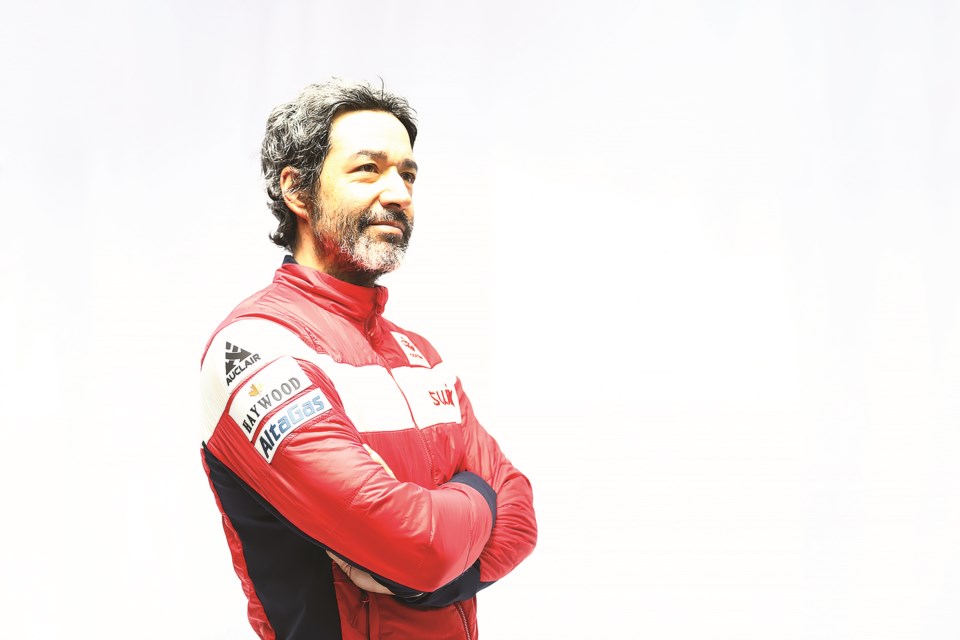BEIJING – Crossing the finish line at Brian McKeever’s final Paralympic race on Sunday (March 13), the enthusiastic Para Nordic Ski team greeted the Para ski legend with glowing smiles, watery eyes, and a knowledge that times are changing.
The 42-year-old from Canmore is Canada’s greatest winter Paralympian ever after winning three gold medals at the Beijing 2022 Winter Paralympic Games, and a history-making 16th gold overall and 20th medals in total, in what is his final Games.
The impact in Para-sports the cross-country skier has made though – and the evolution he's observed – are far grander than two decades and six Paralympics ago when he started his journey.
“There are many more people fighting for the medals and I think that’s a good thing,” McKeever said. “It shows that, first of all, people care more about this now than they once did and I think it’s getting better representation through representation. They’re attracting the attention of not just the average person, but also the youth with disabilities who can see a way forward. They can see if they want to there’s this professional sport path that’s available to them. … It normalizes disability and it equalizes that sense within the community and I think that’s really important.”
McKeever lives with Stargardt's disease – a macular degeneration that's made him legally blind. Russell Kennedy and Graham Nishikawa guided him in Beijing.
The open relay was McKeever’s final race at the Games when he teamed with three-time Paralympic medallist, Brittany Hudak, and guide, Kennedy. The team finished in sixth. Afterwards, Hudak said it was special for her to ski with McKeever at his goodbye Games.
“I have looked up to him for so many years and he has done so much for our sport,” said Hudak, in a press release.
Six-time Paralympic medallist Collin Cameron added: "This team is a family. We wouldn’t be successful without [McKeever] or the friendship, trust and support we all have for each other in the good times and bad."
Prime Minister Justin Trudeau also congratulated McKeever through social media as the Canuck was going out on top.
"Going out on top! In the last individual race of his Paralympic career, [McKeever] has won the gold – it’s his 16th gold medal, and he’s now tied for the most-decorated male Winter Paralympian of all-time," Trudeau wrote.
When McKeever started in 2002 Salt Lake City Paralympics, his older brother and former Olympian, Robin, guided him. It was a different environment 20 years ago, and much has changed – including stiffer competition.
“When I started, there were very few professionals,” McKeever said. “It was truly much more amateur sport that had a day job, let’s call it, and would train around that work and family obligations and then would get time off to go to races. There were very few of us that were professionals and the ones that were, were the best.
“I would say the level at the top hasn’t really changed in all the time, but the fields have gotten much deeper. You’d be hard-pressed to find an athlete here who isn’t a professional athlete, so we created deeper fields, [and] the competition is much harder to win.”
At the Zhangjiakou National Biathlon Centre in China, McKeever made history with his 16th gold, tying the mark for most gold medals ever won by a winter Paralympian with Para alpine skier, Gerd Schönfelder.
It started on March 7 in the men's vision impaired long distance Para cross-country, where McKeever and Kennedy cruised to victory in the 20km classic.
McKeever and Kennedy opened up a big lead over the field, finishing at a time of 55:36.7 – more than three minutes ahead of silver medallist Jake Adicoff of the United States. Taking bronze was Zebastian Modin of Sweden.
On March 9, McKeever and Kennedy did it again after punching the attack in the men’s sprint to take top spot. The Canadians turned on the jets in the final stretch to hold off Adicoff and guide Sam Wood to capture first place at a time of 3:19.5.
McKeever's final individual race on March 12, the middle distance, was when history was made.
The gold medal was McKeever’s to lose as he and Nishikawa jumped out to a big lead early and never let up. They crossed the finish line at a time of 33:06.6.
Sweden’s Zebastian Modin took silver and Ukraine’s Dymtro Suiarko claimed bronze.



.png;w=120;h=80;mode=crop)